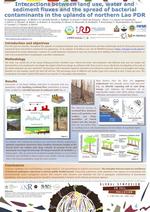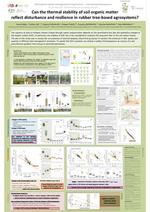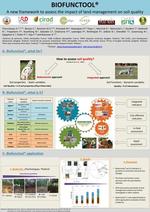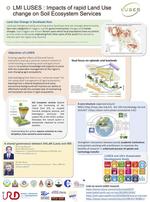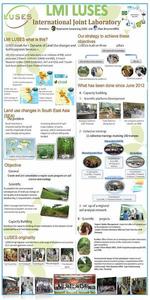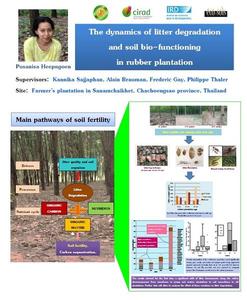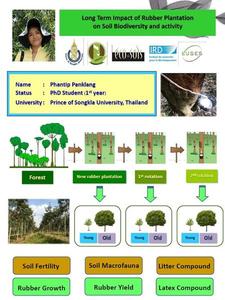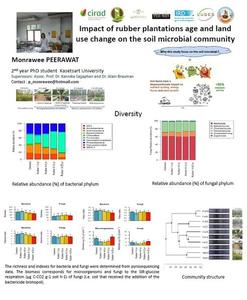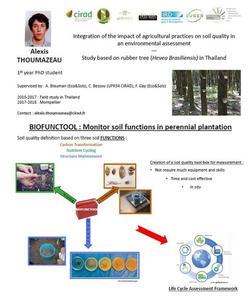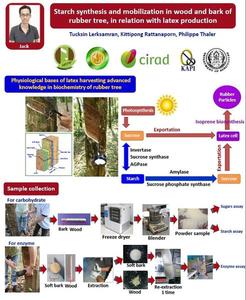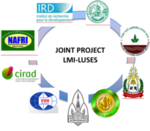LUSES overview
Executive summary
LUSES is an International Joint Laboratory (IJL) consisting of a consortium of Southeast Asian and French member institutions sharing a common research interest, namely: understanding co-evolving social and agricultural systems. Based on biophysical and socio-economical approaches, LUSES aims to foster regional and international scientific collaborations and build capacity in fields related to the impact of land use change on soil-related ecological services. The knowledge and capacity generated through LUSES is expected to assist with the sustainable management of the region’s constantly mutating agro-ecosystems. Soil ecosystem services depend upon the functioning of the Critical Zone (CZ) i.e. coupled chemical, biological, physical, and hydrological processes that support life at the Earth’s surface. In Southeast Asia, land use changes increasingly result from external triggers which correspond to strategies (policies, infrastructures, commercial networks etc.) that human societies design and adopt to harness natural resources and environmental services with the aim of using them to create productive ecosystems. Therefore, understanding the functioning of the CZ in such a context requires scientists to cross disciplines, from natural to social sciences.
Acknowledging that there is no “universal recipe” for the sustainable management of agro-ecosystems, LUSES central assumption is that learning from a diverse biophysical and socio-economical background will improve our ability to maintain soil ecosystem services in agro-ecosystems. To that extent, understanding processes at work in both the up- and low- lands will help identify the existence (or absence) of broad patterns linking land use changes to certain trends in soil ecosystem services change. To address this challenge, IJL LUSES will aim to provide new insight into the social modalities of rapid agricultural land use changes (e.g., intensification, extensification) and their impacts on variably degraded environments. IJL LUSES will also contribute to identify management techniques that maintain soil-related and hydrological services, including the control of pathogenic contaminants.
In a context of unprecedented expansion of perennial plantations in the Lower Mekong Basin, IJL LUSES initially focused on the impacts of the transition from annual to perennial crops on soil and hydrological services. Since 2014, given the increasingly diverse, complex and rapid context of land use change in the Lower Mekong Basin, the scope of IJL LUSES widened, with 3 main research themes that pertain to IRD’s priority research theme on biodiversity, resources and food security, namely, 1) impact of tree plantations on soil functioning and soil biodiversity; 2) management of organic matter for sustainable soil quality and plant production, and 3) effect of land use on stream-ground water interactions, overland flow genesis and the related ecosystem services in tropical agro-ecosystems. In addition LUSES includes an action that focuses on quality assurance across Southeast Asian soil analyses laboratories, as sound and reliable soil analyses are pivotal to the accurate characterization of soil ecosystems services.
For its second phase, starting in June 2017, IJL LUSES will keep this general structure with minor evolutions, namely new collaborations with 1) the University of Science Technology of Hanoi (USTH), one of the regional universities where a large share of LUSES staff is already teaching on a regular basis and is actively involved in setting up a new research laboratory on the Critical Zone. USTH is also a SE Asian higher education institution teaching (at the Bachelor and Master levels) subjects related to soil and water in the framework of a new international Master – “Sud Expert Sol” involving various universities: UPMC (France), Louvain La Neuve (Belgium) and possibly University of Abidjan (Côte d’Ivoire) and Antananarivo (Madagascar) and is one of the few higher education institutions that is in a position to become a member of AUF (Agence Universitaire de la Francophonie) and promote the use of the French language in Southeast Asia and 2) Division of Soil Science, Department of Plant and Soil Science, Faculty of Agriculture, Chiang Mai University, to strengthen activities on soil functional ecology in high value crops such as coffee.
The second phase of LUSES will be coordinated by Dr Nivong Sipaseuth, Deputy Director General of the Department of Agricultural Land Management (DALaM), Vientiane Laos, and Dr Alain Pierret, Institute of Ecology and Environmental Sciences of Paris (iEES-Paris), research scientist with the Institut de Recherche pour le Développement (IRD).
1- Scientific objectives
The LMI will stimulate high quality research and team complementarities, on the impact of agriculture on soil ecosystem services as linked to land use change. The main scientific goals of this project will be:
- To establish the environmental consequences of international market demand driven rapid land use change which has lead to agricultural intensification on natural or already degraded environments,
- To identify management techniques that improve ecosystem services and which could benefit from subsidies in the near future to improve environmental quality, income and the well being of farmers and the South-East Asian population.
2- Capacity Building Objectives
This project will help to reinforce the capacity building of local academic institutes in the domain of soil sustainability and functional ecology.
The aim of this project is to strengthen human capacities and laboratory methodologies of the South East Asian partners in the field of soil, hydrology, and ecological sciences. The laboratories and instruments provide by the LMI will be shared by the intuitions involved.
This means that any of the participating institutions will be able to use the facilities provided by the other partners, the LMI will contribute the laboratory costs incurred by these exchanges. The development of innovative measurement systems and related know-how will improve research capacity of both South Asian and French teams.
Moreover , young researchers and students will get specific training in state of the art methodologies. It is our stated goal that after completion of the project, each partner institution will have a team of young scientists capable of handling activities and research questions related to the ecosystem services studied (biodiversity, carbon sequestration, clean production etc).
3- Training and Education goals
Education and training constitutes a major aspect of this project. This goal will be attained through different modalities:
- Setting up of technology training cooperation units (TTCU)
The setting up of technology training cooperation units (TTCU) will provide the ideal platform for this by facilitating the sharing, transfer and distribution of information to other interested people, such as students.
Through support from LMI network, each partner can establish the training unit and provide an international training curriculum along with the subject/curriculum based on its strength and capacity.
The students who are interested in a specific partner unit of TTCU can participate in this training course, which can then be validated as university credits.
An important objective of this training program is to develop an information and research network between young researchers specializing in environmental science.
- Participation of young southern students to international master and PhD degrees in France
- Involvement of LMI members in local university lectures in order to strengthen local Universities in degree courses about ecology and environmental issues
LMI LUSES Posters
Presentation of the ECOFILTER Team at the Global Symposium on Soil Pollution (GSOP18), FAO, Rome, 2-4 May 2018
Poster of the BIODIV TREE team presented at the SOM management conference held in Braunsweig on the 30 and 31 of May
Poster of the BIODIV TREE team presented at the SOM management conference held in Braunsweig on the 30 and 31 of May
Synopsis of LUSES 2017-2019
- LDD-IRD a long history of scientific cooperation
- Impact of Rubber Tree Plantation on Soil Biological Diversity
- LDD-LMI LUSES Platform of Microbiology
- LMI LUSES presentation
- PCR LDD-LMI LUSES Platform
- Laboratory guide: hygiene and safety in English
- Laboratory guide: hygiene and safety in Thai
PhDs students' scientific posters
The dynamics of litter degradation and Soil-bio functioning in Rubber plantation : Pusanisa Heepngoen
Long term impact of Rubber Plantation on Soil biodiversity and Activity: Phantip Panklang
Impact of Rubber Plantation age and Land use change on the soil microbial community : Monrawee
Integration of the impact of agricultural practices on soil quality in an environmental assessment : Alexis
Starch Synthesis and Mobilization in wood and bark of rubber tree, in relation with Latex production : Tuksin




